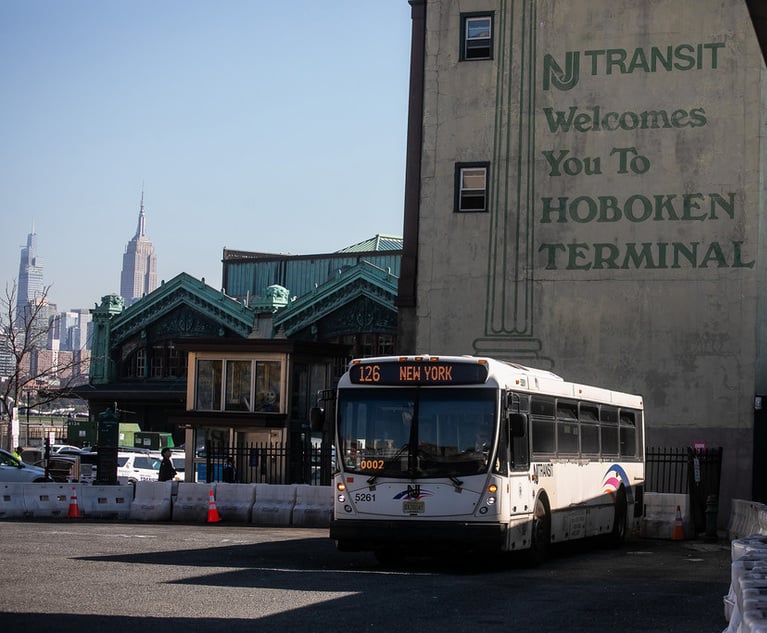Travel Law: Recent Antitrust Litigation
Thomas A. Dickerson reviews recent antitrust class actions involving the travel industry brought by or against airlines, in-flight Internet providers, hotels, tour bus companies, ride-sharing companies and online travel sellers and involving various types of alleged marketing misconduct such as resale price maintenance, parallel business behavior, misleading and unfair price guarantees, elimination of competitors and unfairly raising prices, substantial market foreclosures and price fixing.
September 28, 2017 at 02:03 PM
11 minute read
I have been writing about Travel Law since 1977 and the last three years have been particularly exciting in terms of the developments in this expanding field of law. Recent antitrust class actions involving the travel industry have been brought by or against airlines, in-flight Internet providers, hotels, tour bus companies, ride-sharing companies and online travel sellers and have involved various types of alleged marketing misconduct such as resale price maintenance, parallel business behavior, misleading and unfair price guarantees, elimination of competitors and unfairly raising prices, substantial market foreclosures and price fixing.
Hop-On, Hop-Off Bus Tours
A popular means of exploring large cities is participating in a “hop-on, hop-off” double decker bus tour. Here, the focus is on concepts such as relevant market, competitive effects and barriers to entry as they apply to New York City's hop-on, hop-off bus tour market. Specifically, the court in United States of America and State of New York v. Twin America, Civil Action No. 12-cv-8989 (ALG)(GWG) (S.D.N.Y. March 18, 2015), approved a final judgment (and competitive impact statement) settling an antitrust lawsuit. The lawsuit arose from the joint venture of two hop-on, hop-off tour bus companies whereby they “allegedly controlled all of the most competitively meaningful bus stops on hop-on, hop-off bus tours and increased prices for riders by 10 percent since coming together in 2009. 'By eliminating the competition between them, the largest operators of New York City's iconic double-decker tour buses were able to raise prices and deprive city visitors of the benefits of a free and fair market'.” “US and NY Settle Antitrust Cases Against Bus Companies,” N.Y.L.J (March 18, 2015). The settlement provided for a payment of $7.5 million and giving up 50 bus stops in high-profile locations including Times Square and the Empire State Building.
Hotel Room Price Maintenance
In Online Travel Company Hotel Booking Antitrust Litigation, 997 F. Supp. 2d 526 (N.D. Tex. 2014), plaintiff consumers set forth “three antitrust claims which charge [hotel chains and online travel sellers (OTSs)] with [allegedly] engaging in an industry-wide conspiracy to uniformly adopt resale price maintenance agreements containing most favored nation clauses, in an effort to eliminate price competition among hotel room booking websites.” In addition the complaint alleged that defendants deceptively published “best price” or “lowest price” guarantees on their websites while knowing that “best price” was the same fixed rate offered across all hotel booking websites. In dismissing the antitrust claims the court held that “the real 'nub' of the complaint … Is Defendants' parallel business behavior which is not suspicious … Generally hotels across the industry may find that controlling minimum resale prices is the 'only feasible' way of effectuating a profitable price discrimination strategy—that is, a strategy to 'sell the same product [i.e., hotel room], costing the same to make and sell, at different prices to different consumers'.”
Price Guarantees Deceptive
However, as for defendants' alleged price guarantees (e.g., “OTA Defendant Expedia's best price guarantee: 'Find a cheaper trip within 24 hours of booking and we'll refund the difference-and give you a travel coupon worth $50'”), the court held that they may have been both misleading and unfair
It seems plausible that an ordinary consumer would reasonably infer from this advertisement that Expedia is trolling the online market, looking for the lowest price for a particular room in the 24 hour-period and publishing that rate for the consumer. Expedia even implies that it is putting in its best effort to find the consumer the best price, promoting that if it slips up, the consumer gets a refund and a $50 travel coupon. In reality, Expedia's promise is illusory—it has entered into a contract … that ensures the rate offered is the same 'low' price offered everywhere else online … These allegations, therefore, plausibly show that a reasonable consumer may be mislead to believe she was receiving the lowest price available in a competitive market.
Stifling Ridesharing Competition
In Wallen v. St. Louis Metropolitan Taxicab Commission (MTC), 2016 WL 5846825 (D. Mo. 2016), Uber alleged “violations of the Sherman Act … by Defendants in (their) attempt to prohibit Uber … from competing in the St. Louis market for for-hire transportation. Plaintiffs claim to bring this antitrust action to put an end to the anticompetitive conduct of defendant MTC and several of its commissioners … many of whom are active market participants in the very market that the MTC regulates'.”
Anticompetitive Conduct
In denying the MTC's motion to dismiss the court noted:
Although the MTC argues that [its] powers and authority give rise to a clear articulation of a policy to allow anticompetitive conduct, a close analysis of the MTC's authority establishes just the opposite. The establishment of the MTC demonstrates that the contemplation was that its purpose was to regulate and oversee vehicles for hire to ensure public safety standards and maintain the integrity of the public transportation system. Rather than being exclusionary, i.e., allowing a policy of anticompetition, the statutory framework provides a means for ensuring the vehicle for hire industry is properly licensed, that the rules and fee structures are regulated and the individual drivers properly screened. None of the statutory authority gives any indication that the legislature intended to adopt a policy of anticompetition through the creation of the MTC … The displacement of competition is not the logical result of the statutory framework, rather, the logical result is providing a public transportation system that is safe and efficient. As such, the state has not clearly articulated a policy of allowing anticompetitive conduct.
Uber Price Fixing Conspiracy
In Meyer v. Kalanick, 2016 WL 4073071 (S.D.N.Y. 2016), it was alleged that Mr. Kalanick had orchestrated and facilitated a price fixing conspiracy with Uber drivers to use Uber's pricing algorithm to set the prices charged to Uber riders, thereby restricting price competition among drivers to the detriment of riders. In denying defendants' motion to dismiss, the court noted: “Plaintiff alleges that the drivers have a 'common motive to conspire' because adhering to Uber's pricing algorithm can yield supra-competitive prices … and that if the drivers were acting independently instead of in concert, 'some significant portion' would not agree to follow the Uber pricing algorithm'.”
Arbitration Clause Enforced
In reversing and remanding, the U.S. Court of Appeals for the Second Circuit noted:
This content has been archived. It is available through our partners, LexisNexis® and Bloomberg Law.
To view this content, please continue to their sites.
Not a Lexis Subscriber?
Subscribe Now
Not a Bloomberg Law Subscriber?
Subscribe Now
NOT FOR REPRINT
© 2025 ALM Global, LLC, All Rights Reserved. Request academic re-use from www.copyright.com. All other uses, submit a request to [email protected]. For more information visit Asset & Logo Licensing.
You Might Like
View All
Tensions Run High at Final Hearing Before Manhattan Congestion Pricing Takes Effect
4 minute read
So Who Won? Congestion Pricing Ruling Leaves Both Sides Claiming Victory, Attorneys Seeking Clarification
4 minute read
Decision of the Day: Administrative Court Finds Prevailing Wage Law Applies to Workers Who Cleaned NYC Subways During Pandemic

NY's Top Court Mulls Fate of Personal Injury Claims Against NJ Transit Corp.
Trending Stories
Who Got The Work
Michael G. Bongiorno, Andrew Scott Dulberg and Elizabeth E. Driscoll from Wilmer Cutler Pickering Hale and Dorr have stepped in to represent Symbotic Inc., an A.I.-enabled technology platform that focuses on increasing supply chain efficiency, and other defendants in a pending shareholder derivative lawsuit. The case, filed Oct. 2 in Massachusetts District Court by the Brown Law Firm on behalf of Stephen Austen, accuses certain officers and directors of misleading investors in regard to Symbotic's potential for margin growth by failing to disclose that the company was not equipped to timely deploy its systems or manage expenses through project delays. The case, assigned to U.S. District Judge Nathaniel M. Gorton, is 1:24-cv-12522, Austen v. Cohen et al.
Who Got The Work
Edmund Polubinski and Marie Killmond of Davis Polk & Wardwell have entered appearances for data platform software development company MongoDB and other defendants in a pending shareholder derivative lawsuit. The action, filed Oct. 7 in New York Southern District Court by the Brown Law Firm, accuses the company's directors and/or officers of falsely expressing confidence in the company’s restructuring of its sales incentive plan and downplaying the severity of decreases in its upfront commitments. The case is 1:24-cv-07594, Roy v. Ittycheria et al.
Who Got The Work
Amy O. Bruchs and Kurt F. Ellison of Michael Best & Friedrich have entered appearances for Epic Systems Corp. in a pending employment discrimination lawsuit. The suit was filed Sept. 7 in Wisconsin Western District Court by Levine Eisberner LLC and Siri & Glimstad on behalf of a project manager who claims that he was wrongfully terminated after applying for a religious exemption to the defendant's COVID-19 vaccine mandate. The case, assigned to U.S. Magistrate Judge Anita Marie Boor, is 3:24-cv-00630, Secker, Nathan v. Epic Systems Corporation.
Who Got The Work
David X. Sullivan, Thomas J. Finn and Gregory A. Hall from McCarter & English have entered appearances for Sunrun Installation Services in a pending civil rights lawsuit. The complaint was filed Sept. 4 in Connecticut District Court by attorney Robert M. Berke on behalf of former employee George Edward Steins, who was arrested and charged with employing an unregistered home improvement salesperson. The complaint alleges that had Sunrun informed the Connecticut Department of Consumer Protection that the plaintiff's employment had ended in 2017 and that he no longer held Sunrun's home improvement contractor license, he would not have been hit with charges, which were dismissed in May 2024. The case, assigned to U.S. District Judge Jeffrey A. Meyer, is 3:24-cv-01423, Steins v. Sunrun, Inc. et al.
Who Got The Work
Greenberg Traurig shareholder Joshua L. Raskin has entered an appearance for boohoo.com UK Ltd. in a pending patent infringement lawsuit. The suit, filed Sept. 3 in Texas Eastern District Court by Rozier Hardt McDonough on behalf of Alto Dynamics, asserts five patents related to an online shopping platform. The case, assigned to U.S. District Judge Rodney Gilstrap, is 2:24-cv-00719, Alto Dynamics, LLC v. boohoo.com UK Limited.
Featured Firms
Law Offices of Gary Martin Hays & Associates, P.C.
(470) 294-1674
Law Offices of Mark E. Salomone
(857) 444-6468
Smith & Hassler
(713) 739-1250






